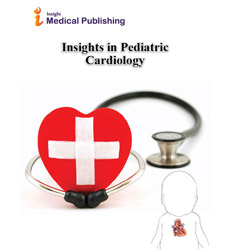Perioperative Betaâ?ÂBlockers for Preventing Surgeryâ?ÂRelated Mortality and Morbidity
Hermann Blessberger
*,
Department of Emergency Medicine, Vienna General Hospital, Medical University of Vienna, Vienna, Austria
- Corresponding Author:
- Hermann Blessberger
Department of Emergency Medicine, Vienna General Hospital, Medical University of Vienna, Vienna, Austria
E-mail: hermann.blessberger@kepleruniklinikum.at
Citation: Blessberger H (2021). Perioperative Betaâ?ÃÂBlockers for Preventing Surgeryâ?ÃÂRelated Mortality and Morbidity, Insigh Pediatr Card Vol.5 No: 014. Received date: December 03, 2021; Accepted date: December17, 2021; Published date: December 24, 2021
Description
Any type of surgery is associated with an increased stress response, which can make the body vulnerable to untoward issues. These issues may range from death to a heart attack and meter disturbances to heart failure, stroke and the suchlike. Betaâ?ÃÂblockers are medicines that devaluate this stress response, which results in decelerating down of heart rate and a fall in blood pressure. Whereas on the one hand, these goods are desirable to fight the stress response, the same goods-if pronounced-may beget veritably low blood pressure, a veritably low palpitation and eventually stroke or death [1].
Surgeryâ?ÃÂRelated Mortality
In our analysis of current substantiation (88 randomized controlled trials with actorâ??s heart surgery-53 trials, other types of surgery-35 trials), we showed that betaâ?ÃÂ blockers had a defensive effect against meter disturbances after heart surgery. We plant no substantiation of an effect of betaâ?ÃÂblockers on death; on the circumstance of heart attacks, strokes or heart failure; or on development of disproportionately low blood pressure or slow palpitation during this type of surgery. Length of sanitarium stay after heart surgery was reduced by about 0.5 days in cases taking betaâ?ÃÂblockers [2]. In nonâ?ÃÂcardiac surgery, betaâ?ÃÂblockers increased the threat of death and stroke, the ultimate only when a representative group of highâ?ÃÂquality trials was analysed. The defensive effect against heart attacks and meter disturbances was cancelled by this increased threat of death and stroke. We couldn't identify substantiation of an effect of betaâ?ÃÂblockers on heart failure or length of stay in this group of cases. In conclusion, perioperative use of betaâ?ÃÂblockers seems salutary overall in cardiac surgery, as they can mainly reduce the high burden of meter disturbances after cardiac surgery. Their influence on death, heart attacks, stroke, heart failure or development of disproportionately low blood pressure or slow palpitation in this setting remains unclear [3].
Surgeryâ?ÃÂRelated Morbidity
In non cardiac surgery, substantiation shows an increase in death and a implicit increase in stroke rate with the use of betaâ?ÃÂblockers. The substantial reduction in meter disturbances and heart attacks in this setting seems to be neutralizing by this implicit increase in mortality and stroke. As the quality of substantiation is still low to moderate, more substantiation is demanded before a definitive conclusion can be drawn [4]. Data were examined from 40 preterm born NICU babies (23 joker) born at 27.0 ± 3.1 weeks gravid age who passed concurrent cardiorespiratory and pharyngoâ?ÃÂesophageal motility protocols. All studies were performed at the child feeding diseases innovative exploration program at nationwide children's hospital, Columbus, OH, USA. Data from babies were included for analysis if they met the following criteria (a) Born preterm ( gravid age<37 weeks); (b) Appertained for feeding/ swallowing evaluation; (c) Near full â?ÃÂterm status (between 36â??40 weeks PMA) and enterally feeding at time of evaluation; (d) Were discharged orally feeding. Babies were barred if they had known chromosomal and inheritable diseases or airway â?àdigestive tract surgery. Prior to the study, informed maternal concurrence and Institutional Research Review Board blessing at Nationwide Children's Sanitarium were attained. Health insurance portability and responsibility policy guidelines were followed. Subject safety was continuously covered by the study croaker and registered nanny at the bedside during the procedure [5].
References
- Abuâ?ÂShaweesh JM, Martin RJ (2017) Caffeine use in the neonatal intensive care unit. Semin Fetal Neonatal Med 22: 342â??347.
- American academy of pediatrics committee on fetus and newborn (2008) Hospital discharge of the highâ?Ârisk neonate. Pediatrics 122: 1119â??1126.
- Bakewellâ?ÂSachs S, Medoffâ?ÂCooper B, Escobar GJ, Silber JH, Lorch SA (2009) Infant functional status: The timing of physiologic maturation of premature infants. Pediatrics 123: e878â??e886.
- Chandrasekharan P, Rawat M, Reynolds AM, Phillips K, Lakshminrusimha S (2018) Apnea, bradycardia and desaturation spells in premature infants: Impact of a protocol for the duration of 'spellâ?Âfree' observation on interprovider variability and readmission rates. Am J Perinatol 38: 86â??91.
- Shimony A (2012) Beneficial effects of RV non-apical vs. apical pacing: a systematic review and meta-analysis or randomized-controlled trials. Europace 14: 81â??91.
Open Access Journals
- Aquaculture & Veterinary Science
- Chemistry & Chemical Sciences
- Clinical Sciences
- Engineering
- General Science
- Genetics & Molecular Biology
- Health Care & Nursing
- Immunology & Microbiology
- Materials Science
- Mathematics & Physics
- Medical Sciences
- Neurology & Psychiatry
- Oncology & Cancer Science
- Pharmaceutical Sciences
